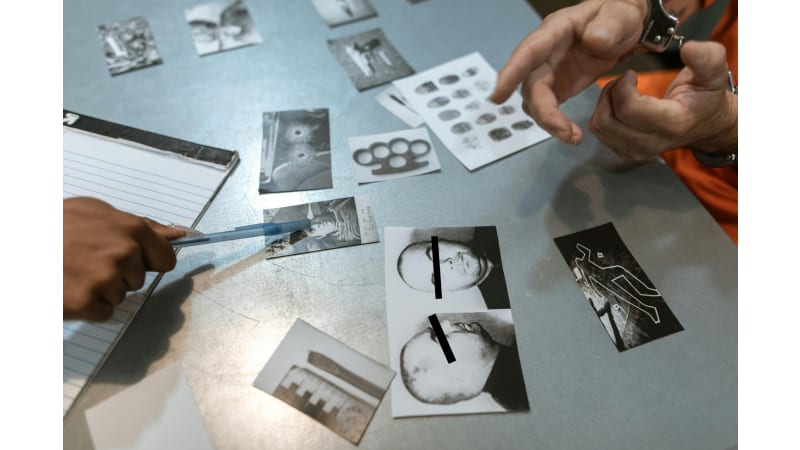How to Become a Forensic Psychologist

So, you have made up your mind to pursue this rewarding career. Where to go? These are the top colleges in psychology where you can find the best programs to pursue your Forensic Psychology degree.
| School Name | Undergraduate Tuition | Graduate Tuition |
|---|---|---|
| Embry-Riddle Aeronautical University-Prescott | $37,512 | $18,756 |
| CUNY John Jay College of Criminal Justice | $6,930 (In-state) / $14,880 (Out-of-state) | $11,090 (In-state) / $20,520 (Out-of-state) |
| Maryville University | $24,766 | - |
| Quincy University | $31,160 | $12,000 |
| Corban University | $33,688 | $9,760 |
| University of California, Los Angeles (UCLA) | $13,752 (In-state) / $46,326 (Out-of-state) | - |
Key Takeaways
- A doctorate degree is required to become a forensic psychologist.
- Those pursuing a career in forensic psychology need to pass the Examination for Professional Practice in Psychology in order to become licensed.
- Forensic psychologists need critical thinking and communication skills, an attention to detail, and objectivity in order to be successful.
Do you wonder what makes criminals commit heinous crimes? Forensic Psychology is about finding these answers. It emphasizes the role of psychology in criminal behavior. If you want to learn how to become a Forensic Psychologist, this guide discusses everything, from the best universities to skills and more.

How to Become a Forensic Psychologist
Forensic psychology is the career you are looking for if you want to study the minds of criminals and help officials find the reasons behind criminal behaviors. Here’s how you can become a forensic psychologist:
Start with College
The first step is getting a bachelor’s degree at college. It’s best if you study forensic psychology, studying general psychology is good, too. You’ll learn about how people think, and behave, and how laws work with psychology. This takes about four years.
Attend a Graduate School
After you finish college, you’ll need a master’s degree and a doctorate. The forensic psychology doctorate is a higher degree that establishes your expertise in psychology. This takes a long time, usually five to seven years.
Get Hands-On Experience
Internships are special opportunities where you learn by doing real work under the supervision of experts. This helps you understand how to use what you learn in real life.
Earn a License
To work as a forensic psychologist, you need a license. Getting licensed means working hours under a professional psychologist and passing the EPPP test. This test checks whether you know enough to work.
Consider Getting Certified
The American Board of Professional Psychology offers a certification that says you are an expert. A certification can help your career a lot.
Getting certified isn’t mandatory, it’s a way to tell everyone you are serious and good at your job. It makes you stand out in the field of psychology.
Back to TopThe Skillset of a Forensic Psychologist
To become a forensic psychologist, you need several important skills. Here’s a breakdown of these skills:
Critical Thinking
A forensic psychologist needs to be a bit like a detective. They look at the evidence, which can be how people act or say, and think deeply about what it means. This helps them understand the truth about a situation, which is super important when explaining things in court as an expert.
Communication Skills
These psychologists talk to many different people, including lawyers and even those involved in legal cases, like victims or those accused of crimes. They need to listen well and talk clearly so everyone understands them.
Clinical Research
Forensic psychologists use their understanding of human behavior to notice why people may behave a certain way. They learn from new research to stay good at their jobs, especially when examining why people do what they do.
Attention to Detail
Forensic psychologists must pay attention to small things. They need to notice not just what people say but how they say it or what they do while they say it. Even tiny details can help solve big questions in legal cases.
Counseling Techniques
Forensic psychologists need to know the best ways to talk to these people to help them feel better without making things worse. They use their knowledge to provide comfort and support while being professional and kind.
Ethics
When working with sensitive information, forensic psychologists must be very careful. They should have a strict table of rules. They can’t share secrets about the cases or the people involved. This helps protect the privacy of individuals and keeps the information safe.

Objectivity
Forensic psychologists must stay neutral. However, the cases can be very challenging, especially those involving serious crimes. They should not let their personal feelings change how they view the facts. They should aim to provide clear and unbiased information to help the court make fair decisions.
Back to TopWhat does a forensic psychologist do?
A forensic psychologist interacts with law enforcement agencies and courts to help solve cases by understanding why people act as they do. Forensic psychologists have many important jobs depending on the needs of the case.
Here are some of the things a forensic psychologist does:
Helping in Court
A forensic psychologist can act as an expert witness in court. This means they help the judge and jury understand the psychology of the people involved in the case. They share their special knowledge about human behavior.
Assisting Victims
Sometimes, people who have seen or been part of sad and scary events might feel upset. Forensic psychologists talk to these victims to help them feel better and cope with their stress.
Studying Criminals
These psychologists also try to understand criminals by examining what might trigger them to do bad things. This helps predict if they will do something harmful again and helps keep people safe.
Checking if Defendants Can Go to Court
Before someone can be tried in court, a forensic psychologist checks if they are mentally fit to understand and participate in their trial. This is important to ensure that everyone gets a fair chance in court.
Helping Kids in Tough Situations
In cases of mistreatment or when parents fight over custody, forensic psychologists help. They talk to the children and help them deal with their feelings. They make sure the children’s voices are heard and considered in decisions that affect them.
Planning How to Help Offenders
Forensic psychologists work with courts and places where offenders are sent to improve their behavior. They help create plans that teach these individuals better ways to behave.
Cross Checking Witnesses
They interrogate witnesses to determine whether they are telling the truth. This helps assure that the information delivered to a court is as accurate as possible.
Back to TopTop Colleges to Study Forensic Psychology
- #2 Best Liberal Arts Colleges in Arizona 2025 #3 Best Small Colleges Arizona 2025 #4 Best Private Colleges in Arizona 2025 #6 Best Colleges in Arizona 2025
Tuition + fees
$40K
Acceptance
68%
Graduation
71%
Student body
3K
Median SAT/ACT
1275/27
Career Outlook for degree at Embry–Riddle Aeronautical University, Prescott
Cost of Degree: $42,204Expenses: $21,064Starting Salary: $70,300Cost Recoup Time: 15 yearsPaid back at 15% of annual salary- Undergraduate tuition is $37,512
- Graduate tuition is also $18,756
- Retention rate: 78%
- Acceptance rate: 74%
- No. of Students: 3,071
- The school is a private college
At Embry-Riddle Aeronautical University-Prescott, students learn how people think and act in crimes. They also get to do many fun activities, like working in labs and solving mysteries using science.
They learn why some people break the law and how to find clues at crime scenes. Students also get to work on a big final project that lets them use everything they have learned. The best part is that the teachers and other students are friendly and help everyone do their best.
- #3 Best Liberal Arts Colleges for Criminal Justice Degrees #8 Best Colleges and Universities for Criminal Justice Degrees 2025 #7 Best Online Colleges in New York 2026
Tuition + fees
$7K
Acceptance
51%
Graduation
54%
Student body
19K
Career Outlook for degree at John Jay College of Criminal Justice
Cost of Degree: $7,470Starting Salary: $50,000- Undergraduate In-state students in New York pay $6,930, and out-state students pay $14,880
- Graduate students from New York pay $11,090, and others pay $20,520
- Retention rate: 78%
- Acceptance rate: 45%
- Students enrolled: 15,210
CUNY John Jay College of Criminal Justice is a great school in Brooklyn for students who want to learn why people do what they do, especially when it involves crimes. Students work towards a bachelor’s degree in forensic psychology and must complete 120 credits. 43-53 out of 120 credits are especially about learning forensic psychology. This isn’t regular schoolwork.
They learn about how people think, how they act with others, and how they grow up. They also learn to study things carefully and use numbers to understand information better. Students can choose to do a big project or get out there and see what the work is like. At the end of their studies, they do a final project to demonstrate everything they’ve learned.
- #9 Best Grad Schools in Missouri 2025 #9 Best Research Universities in Missouri 2025 #3 Best Online Bachelor's of Cybersecurity Degree Programs in Missouri #4 Best Online MBA in Data Analytics Ranked for Students in 2024
Tuition + fees
$27K
Acceptance
88%
Graduation
67%
Student body
14K
Career Outlook for degree at Maryville University
Cost of Degree: $27,166Starting Salary: $51,100- Tuition: $24,766
- Retention rate: 87%
- Acceptance rate: 87.8%
- Students enrolled: 10,000+
Maryville offers a Bachelor of Arts (BA) in Forensic Psychology, providing a strong foundation in psychology and the legal system. The program is well-suited for students pursuing graduate studies in forensic psychology.
Undergraduate tuition varies depending on enrollment status (full-time, part-time, online). Maryville’s program is a great option for students seeking a strong undergraduate foundation in forensic psychology. The flexible online format caters to students with various needs and schedules. The school is ideal for students aiming for a bachelor’s degree as a stepping stone to graduate studies or careers in related fields.
Maryville University’s Online Degrees
EdD in Education Leadership
- Required Credits: None Reported
- Completion Time: None Reported
- Format: Online
DNP in Nursing
Degree Concentrations
- Family Nurse Practitioner
- Adult-Gerontology Primary Care Nurse Practitioner
- Adult-Gerontology Acute Care Nurse Practitioner
- Pediatric Nurse Practitioner
- Psychiatric Mental Health Nurse Practitioner
- Required Credits: 66-77
- Completion Time: None Reported
- Format: Online
DNP in Nursing Practice
Degree Concentrations
- Doctor of Nursing Practice with NP
- AGACNP
- Required Credits: 33
- Completion Time: None Reported
- Format: Online
- #18 Best Online Colleges in Illinois 2024 #25 Best Online Bachelor’s of Human Services Degree Programs Ranked for 2024
Tuition + fees
$32K
Acceptance
62%
Graduation
50%
Student body
1K
Career Outlook for degree at Quincy University
Cost of Degree: $35,740Starting Salary: $46,000- Undergraduate tuition: $31,160
- Graduate tuition: $12,000
- A Catholic university is located in Quincy, IL
- Offers both online and campus programs
Quincy University in Illinois is a fantastic place for students who want to study forensic psychology. This Catholic university offers a bachelor’s degree in forensic psychology. It teaches students the basics of psychology and gives them a detailed look at how psychology applies to the legal system.
The program includes exciting classes that cover different parts of forensic psychology, such as understanding how police work psychologically, studying criminals and their behaviors, learning about victims and how to help them, and looking at how psychology works in legal and correctional settings.
Students can join clubs like the Psi Chi Honor Society or the Psych Club. It lets them meet other students with similar interests and do service projects in Illinois and other places in the USA.
- #5 Best Christian Colleges in Oregon 2026 #8 Best Private Colleges in Oregon 2024 #3 Best Online Colleges in Oregon 2026 #4 Best Online MBA Programs in Oregon
Tuition + fees
$36K
Acceptance
35%
Graduation
54%
Student body
2K
Career Outlook for degree at Corban University
Cost of Degree: $37,208Expenses: $16,486Starting Salary: $40,200Cost Recoup Time: 19 yearsPaid back at 15% of annual salary- Undergraduate tuition: $33,688
- Graduate tuition: $9,760
- Offers online and campus options (focusing on a Christian approach to education)
- The retention rate is 71%, showing student satisfaction
- The acceptance rate is 38%, making it a selective institution
- Students enrolled: 1,082
Corban University in Salem, Oregon, offers a unique bachelor’s degree in forensic psychology. This program integrates a Christian viewpoint with studying the human mind and behavior as it relates to the law. This 120-credit program covers many interesting topics from a biblical perspective, such as:
- Criminal law
- How to help people in crisis
- The legal side of gathering evidence
- Understanding people’s development from birth to old age
What makes Corban stand out is its commitment to hands-on experience. Students can choose to intern in psychology or criminal justice settings. These internships might be at places like public defender offices or with adult or juvenile corrections. This practical approach prepares them for real-life work after graduation. It allows them to apply what they learn in class to work environments.
To get into Corban, students can share their faith because the university values a strong Christian faith. High school students must have at least a 2.7 GPA and a reference of their Christian character. If you’re transferring from another college, you should have at least 31 college credits.
- #3 50 Best Public Colleges and Universities Ranked for Students in 2025 #3 50 Best Public Grad Schools 2025 #3 Best Value Colleges and Universities Ranked for Students in 2025 #7 America's 15 Most Technologically Advanced Colleges
Tuition + fees
$13K
Acceptance
9%
Graduation
92%
Student body
49K
Career Outlook for degree at University of California, Los Angeles
Cost of Degree: $13,747Expenses: $24,284Starting Salary: $73,200Cost Recoup Time: 11 yearsPaid back at 15% of annual salary- In-state tuition: $13,752
- Out-of-state tuition: $46,326
- Retention rate: 97%
- Acceptance rate: 8.6%
- Students enrolled: 41.367
UCLA offers a Forensic Psychiatry Fellowship that prioritizes education over service, shaping well-rounded leaders in the field of forensic psychology. This prestigious program equips you for diverse roles, from expert witness and forensic consultant to policy advocate. Fellows gain proficiency in designing forensic assessments, reports, and courtroom testimony.
UCLA’s renowned faculty, including former presidents of the American Academy of Psychiatry and the Law (AAPL), provides mentorship to fellows. The curriculum emphasizes strong forensic skills and ethical decision-making, with seminars, including a Landmark Case Seminar in collaboration with Hastings Law School and UCSF.


Related Questions
Is it hard to be a forensic psychologist?
Becoming a forensic psychologist is a lengthy process that may take 5-7 years. This involves completing a bachelor’s degree, followed by a master’s degree and a doctorate.
What is the course of forensic psychology?
The course provides a thorough grounding in general psychology while offering specialized knowledge and training in forensic psychology. It covers theory as well as practical application.
What is the average age of a forensic psychologist?
The typical age of a forensic psychologist is 46 years.
Conclusion
Forensic Psychology applies psychological theories and methods to the legal system. It helps police and other professionals by studying criminal profiles, criminal responsibility, and the mental status of offenders. If the profession interests you, pick the best college from the list and pursue your dreams.